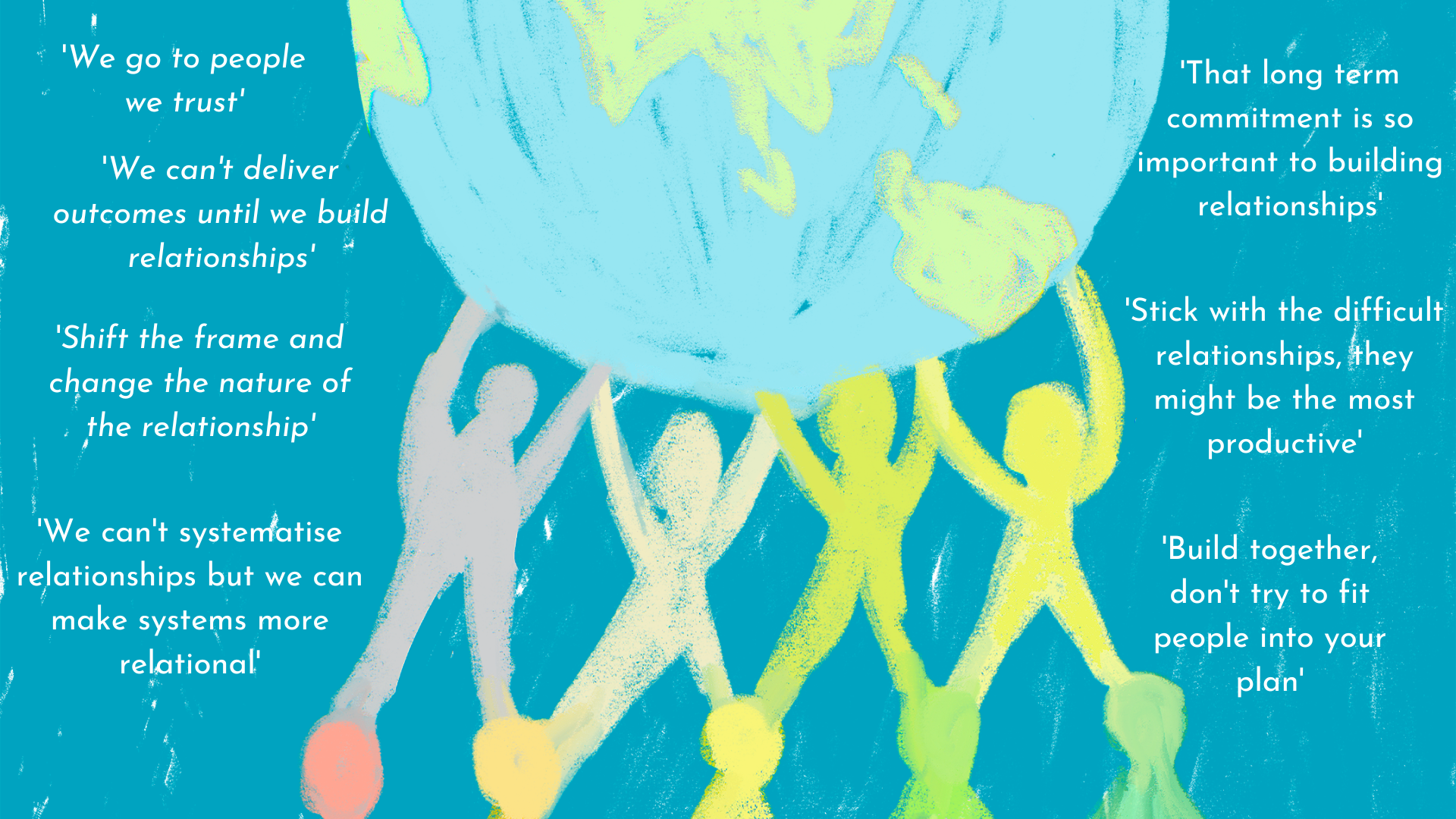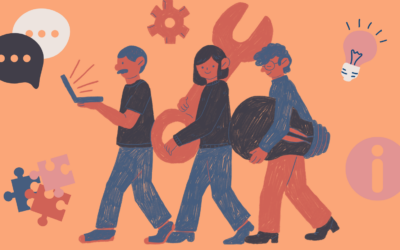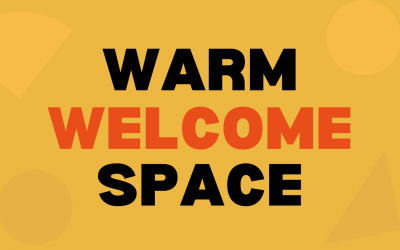The Relational Councils Network gathered on 30/1/23 to talk about the cost-of-living crisis and relational responses. Partners from the council and the community in Barking and Dagenham provided the key note experience.
A list of links and resources mentioned in the discussion is shared at the end of this blog. And here is a blog that Alex Fox from the Mayday Trust wrote afterwards. The slides used during the session can be viewed here.
This piece brings together some of the nuggets that caught our attention. These are just some of the insights. If you were there, you will have more. If you weren’t, you may have things to add or to ask. Do please leave a comment below or get in touch.

Adapted from the brilliant work of Veronika Belcheva
It’s Winter 2023. More people, previously balancing on the edge, are slipping into destitution, unable to meet basic needs for food, warmth and shelter. Councils everywhere are facing rapidly escalating need. Poverty may often be the presenting problem. More complex needs, not far behind.
In this Relational Councils Convening, we came together to share approaches to tackling the consequences of the cost of living crisis.
A lot of mutual aid [during Covid] was more aid than mutual. A crisis that lasts longer and affects more calls for acts of solidarity more than acts of charity
We go to people we trust
We know that residents go to people that they trust for help. Be it at the laundrette or the post office, or to a friend at church. They are least likely to come for support at the council. So we needed to design something which was really about building trust in place and working alongside them.
In times of difficulty, we turn first to those we know that we can rely on. Much of the work we talked about builds on this simple insight. Barking and Dagenham council located and resourced community partners who are closest to those who are likely to need help. In turn, those partners operated in neighbourhoods, supporting very local networks of assistance.
We can’t deliver outcomes until we build relationships
The Barking and Dagenham work has three, very broad KPIs – trust, belonging, connection – each progressed through the building of relationships. For Brighton and Hove the foundation stones are trust, power and voice but again with strong relationships as the operating principle.
The magic happens through relationships. Where people laugh together, where people cry together, where people break bread together: these are the places where the magic happens
People don’t always know what they need – but if you build the relationships you can learn together about what would be of value to people and communities.
Relationships alone won’t solve every problem but it is through relationships that we can find and access the help we need.
Trauma happens through relationships but it’s also healed through relationships. All services should be trauma-informed. That means they are relational
Shift the frame and change the nature of the relationship
In the context of relationships with our residents “relationship-centred practice means moving from ‘service users’ to citizens and community”.
Shifting the framing shifts the approach. When the council thinks about residents rather than service users, it sees the whole person and the whole community and it sees itself as an enabler rather than a sole provider. This unleashes potential in the voluntary sector and the wider community, and reaches the parts that the more limited framing rarely touches.
Money, yes. But money in the right hands
In these cash strapped times it is especially tempting to think about communities as a cut price or even a free solution. It is more helpful to think about value for money, the best way of spending public money, rather than something for nothing.
We’ve taken money – £4m – out of reserves to support our communities through this situation. And even more interestingly, there was a very clear steer for politicians that at least £1m of that had to go to a large set of partners because we’re acknowledging the importance, the role and the priority of working together and how close our communities and our community partners are to our residents who may never want to touch our front door but also may not need to touch our front door if our communities are supporting each other and if they’re working together.
Building meaningful relationships takes time
Trust is built over time. Organisations need continuity, stability and “compassionate tenacity” to develop the meaningful relationships that are most needed at this time.
The transience of organisations is a challenge. Relationships are so personal – they move on or are removed as people move on
What faith organisations give you is consistency. They’re not going anywhere. That long-term commitment is so important to building trust and building relationships
Time is just as important in the hidden work of relationships – building meaningful connections between organisations – as it is in the frontline work:
For us this is a 7 or 8 year journey
Both groups (council and community partners) have developed trust spanning a number of years of working together and dealing with difficult issues, which has led to understanding each other and accepting differing and competing aims and objectives and (developing) a synergy of what we are all trying to achieve
From a council perspective there is no way we could have done this if we hadn’t been working alongside one another for a number of years.
Relational practice is about building something together, not fitting into someone else’s plan
Meaningful relationships are agents of change. Productive collaboration requires us all to be open to the challenges and the opportunities that emerge when working with others. With this trust, transparency and reciprocity of respect, we become more than the sum of the parts.
When we had our first meeting, some of us walked away with cognitive dissonance because we were looking at presentations from the local authority that had zero structure. And we thought, right, okay, what are we supposed to be doing here? But interestingly, that lack of structure allowed for organic conversations to take place.
“Over a brew” sessions – a space just to listen – may look accidental but can be very productive. Just a few prompt questions then conversations led by the people who come, not driven by the presentations that are delivered.
Give staff the trust, freedom, flexibility and a bit of budget to go out and do what needs to be done
Stick with the difficult relationships, they may be the most productive
It is always attractive for organisations (not only councils) to choose partners from “the usual suspects” – people we agree with, organisations a bit like us. To reach people we have missed in the past, and to achieve things that we have not achieved in the past, we need to be open to different kinds of relationships with organisations and with people who may, at first glance, be a less easy fit.
We find the most interesting relationships come following the very difficult conversations – whenever we manage to stay in the space together. Councils are much less ready for this
I think naming the latent competition between local orgs, as well as the courage to lean into other difficult conversations and disagreements are so important to building these relationships
Sometimes we need to work with awkward people too – not just the groups that councils usually think are ok
We can’t systematise relationships, but it should be possible to make systems more relational
We in The Relationships Project think a lot about how we change the soul of an organisation, rather than bolt a useful project on the side. Council’s responses to the cost of living crisis, including much of the work that we discussed in this session, point to a more flexible, more empathetic, more empowering and more relational approach than might have previously characterised their work. It may provide an opportunity to ignite wider change in the longer term whilst also, and demonstrably, meeting local needs today.
We’ve created systems that silo problems. We need a new paradigm, a new way of looking at things. Ultimately, we need to strengthen the ecosystem – strengthening the relationships between different parts of the system
We have to do some translation work – we act as a buffer between community organisations and our colleagues in other parts of the council. We have to translate qualitative data into data that makes sense to other parts of the system
We are grateful to everybody who participated in this discussion and particularly all our friends in Barking and Dagenham who were so open and thoughtful in sharing their experience.
If you have an idea for the next session of the Relational Councils Network, we would love to hear from you. Please contact Gemma (gemma.Drake@lbbd.gov.uk), Immy (immy@relationshipsproject.org) or David (david@relationshipsproject.org)
Resources & links shared during the session:
- https://www.mysociety.org/climate/climate-prototyping/
- https://www.communityledhousing.london/coproduction/
- https://www.barkingmosque.org.uk/
- https://ratio.org.uk/rtalks/don-berwick-on-how-to-be-wrong/
- https://www.scie.org.uk/files/strengths-based-approaches/what-next-for-strengths-based-areas.pdf
- https://www.mcractive.com/news/be-brave
- www.camerados.org
- https://resiliencelearningpartnership.co.uk/
- https://maydaytrust.org.uk/
- www.lacnetwork.org
- https://www.selfimprovementdailytips.com/podcast/falling-not-failing#:~:text=It’s%20actually%20only%20a%20small,you’re%20likely%20to%20fall
More from The Relational Councils Network
A ‘Society of Service?’: Practical ideas for local and central government
In brief Days after the Prime Minister launched a bold new Civil Society Compact, the Health secretary announced a major public consultation on the future of the NHS and the Chancellor introduced a budget that squeezed frontline services in the short term, invested in...
Relational Councils: Learning from crisis
Mutual aid was driven from the ground up but flourished with appropriate support from local councils. The UK response to refugees arriving from Ukraine was led from the top down but could only succeed with local engagement. What can we learn from this approach to the...
Sustaining the care: Learning from the Warm Hubs experience
What can we learn from the Warm Hubs experience about how to create ‘relational spaces’? And how can this learning, combined with the learning from the community response to the covid pandemic, inform and inspire a bottom up, relationship centred approach to...



